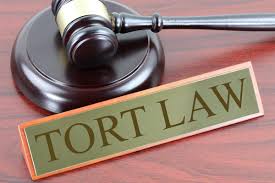Latest News
Law of torts and developments

The word torts' comes from the Latin expression tortum which suggests twisted/crooked/ wrong. Tort' in French is like nation word wrong and therefore the Roman expression delict. in an exceedingly society once a private diverges from the normal course of straight conduct to a crooked various, he's believed to own committed actus reus - a conduct that is twisted or crooked. The person committing such crooked act is labeled as a party. The focus of dialogue concerning torts can invariably begin with Salmond's college of legal interpretation that denotes law to be consisting of rules that square measure recognized and acted upon by Courts of Justice. However, before the dominance of the State because the guardian, law was implemented by a private whose right has been allegedly profaned by clans. in keeping with Henry Pine Tree State this was the Penal Law of ancient communities that has emerged because the law of wrongs in modern-day society and has been attributed because the Law of Torts. generally process, actus reus could also be classified as AN act of misconduct which might be redressed by AN action for unliquidated damages. In India, the law of torts defines and provides remedies for non-contractual acts that square measure civil in nature. before William the Conqueror's 1066 subjection of European country, the system was rather chaotic, steered on a case-to-case basis. Post 1066, when the subjection, fines for unlawfulness were directed to be paid on to the courts or the King, rather than intermediaries and this method quickly became a supply of robust revenue generation. A wrong came to be referred to as a actus reus or trespass, and a particular line was drawn between civil petitions and pleas to the Crown, the later largely encompassing penal provisions. when the subjection, once French became the first language in England's judiciary, it saw several of English law's technical terms having their origin to French, of that tort' is one.
The Indian Scenario:
It is a documented proven fact that the pertinency of the torts in India is way rudimentary in structure as compared to British Law. preponderantly, within the Indian system, relatiative and corrective remedies square measure additional hip than compensation for wrongs. In India, nation Law of Torts has undergone an artificial Indianization assuaging to the principles of Justice, Equity and smart Conscience that has remained the elemental philosophy of the country's statute legislative system.
In M.C. Mehta v. Union of India, Justice Bhagwati said:
we have to evolve new principles and lay down new norms which can adequately manage new issues that arise in an exceedingly extremely industrial economy. we tend to cannot enable our judicial thinking to be created by relation to the law because it prevails in European country or for the matter of that in any foreign country. we tend to square measure actually ready to receive lightweight from no matter supply it comes however we've got to make our own jurisprudence.
It is pertinent to say here that Section nine of The Code of Civil Procedure 1908, as amended, that empowers the Civil courts of the land to undertake all suits that square measure civil in nature, impliedly attributes jurisdiction belowtake|to do} cases under the Law of Torts supported the basics of Justice, Equity and smart Conscience. In different words the Civil courts will draw upon its inherent powers for decisive liability as outlined in an exceedingly actus reus continuing.
In Jay Laxmi Salt Works (P) Ltd. v. State of Gujarat, Sahai, J., held:
...truly speaking the complete law of torts is based and structured on morality. Therefore, it'd be primitive shut|to shut} strictly or close finally the ever increasing and growing horizon of tortuous liability. Even for social development, orderly growth of the society and cultural refinedness, the liberal approach to actus reus liability by court would be causative.
In lightweight of the higher than two judgments, ANd with an objective to form a particular Indian jurisprudence system, the subsequent heterogenous branches of Law of Torts are statute in India amongst others:
• Judicial Officers Protection Act,1950
• Indian Carriers Act, 1865
• Cattle Trespass Act, 1871
• Easement Act, 1882
• Workmen Compensation Act,1923
• War Injury (Compensation Insurance) Act,1943
• Fatal Accidents Act,1955
• Trade and Merchandise Act, 1958
• Specific Relief Act, 1963
• Air (Carriage by Air) Act, 1972
• Bhopal Gas Leak Disaster (Processing of Claims) Act,1985
• The shopper Protection Act,1986
• Motor Vehicles Act, 1988
Landmark Cases of Torts in India:
• Pravat Kumar Mukherjee Vs. Ruby General Hospital and ors 2005 CPJ thirty five
• Shashi Tharoor vs Arnab Goswam CS(OS) 253/2017
• D.K.Basu v. State of West Bengal
• Alka Lamba Trespass case
• Ushabti vs Bhagya Lakshmi Chitra Mandi
• Khenyei vs New India Assurance Co. Ltd.& Ors
• Jacob Mathew vs State of geographic region & Anr
Conclusion:
The law of Torts in India may be a comparatively a replacement branch of evolving clustered law that has to be supplemented by codifying statutes by delivery it beneath the extent of 1 umbrella upon the premise of the maxim ubi jus ibi remedium. Improvising on the present laws can beyond any doubt strengthen the religion of voters, we tend to the individuals of India, however will elevate the image of the country within the international arena of legal fraternity.



































































































